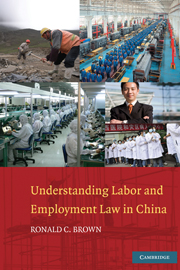Book contents
- Frontmatter
- Contents
- Preface
- Acknowledgments
- Understanding Labor and Employment Law in China
- PART I UNDERSTANDING CHINA'S REGULATION OF THE WORKPLACE
- PART II EMPLOYMENT RELATIONSHIPS
- PART III HIRING AND EMPLOYMENT PRACTICES
- PART IV WORKING CONDITIONS, WAGES, AND HOURS
- PART V EMPLOYEE BENEFITS: LEAVES, MEDICAL, MATERNITY, WORK-RELATED, UNEMPLOYMENT, AND PENSION INSURANCE
- PART VI DISCIPLINE AND TERMINATION UNDER EMPLOYMENT AGREEMENTS
- PART VII RIGHTS, REMEDIES, AND MULTIPLE FORUMS
- 15 Working Labor and Employment Law Illustrations
- 16 Illustrative Contracts
- Appendix
- Index
- References
15 - Working Labor and Employment Law Illustrations
Published online by Cambridge University Press: 22 January 2010
- Frontmatter
- Contents
- Preface
- Acknowledgments
- Understanding Labor and Employment Law in China
- PART I UNDERSTANDING CHINA'S REGULATION OF THE WORKPLACE
- PART II EMPLOYMENT RELATIONSHIPS
- PART III HIRING AND EMPLOYMENT PRACTICES
- PART IV WORKING CONDITIONS, WAGES, AND HOURS
- PART V EMPLOYEE BENEFITS: LEAVES, MEDICAL, MATERNITY, WORK-RELATED, UNEMPLOYMENT, AND PENSION INSURANCE
- PART VI DISCIPLINE AND TERMINATION UNDER EMPLOYMENT AGREEMENTS
- PART VII RIGHTS, REMEDIES, AND MULTIPLE FORUMS
- 15 Working Labor and Employment Law Illustrations
- 16 Illustrative Contracts
- Appendix
- Index
- References
Summary
Rights, Remedies, and Multiple Forums
Labor rights in China, as elsewhere in the world, may emanate from a variety of sources, including international, national, statutory, and contractual law. From these sources come alternative avenues of regulation and enforcement: administrative, labor arbitration, and the courts. The use of these varied approaches can be seen from a brief illustration. Suppose a female employee with a labor contract is discriminated against at work by her employer. Under the Women's Rights and Interests Law, she may complain to administrative authorities, which may investigate and impose sanctions; under this law, she also has a right to proceed to court, but because it is a “labor dispute,” she also has a right (if not a duty) to go to labor arbitration. Similar alternatives are available for an employer that has a trade secret compromised by an employee. The Law against Unfair Competition prohibits infringement of trade secrets, and the employer may take the matter to the State Administration of Industry and Commerce (SAIC), which is empowered to deal with and resolve disputes related to trade secrets. If a labor contract protects confidential information, the labor arbitration process will also be available. Access to the court could arise under either avenue.
Another example is a work-related injury that may need an assessment by the administrative agencies for labor security (usually the local bureau of labor and social security) of the percent of permanent injury; once that administrative agency determines the percent of injury, the employer may dispute the assessment or the duty to pay the employee.
- Type
- Chapter
- Information
- Understanding Labor and Employment Law in China , pp. 187 - 199Publisher: Cambridge University PressPrint publication year: 2009



